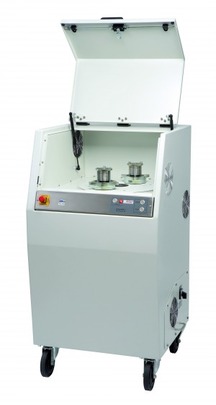
The Pulverisette 4 classic line vario-planetary mill from Fritsch is designed for use in materials research and applications where a powerful planetary mill is required.
The mill is capable of emulating ball mills of conventional design, precisely simulating the types of stress entailed and therefore reproducing or optimising grinding processes.
The mill is said to be ideal for mechanical activation and alloying.
When particles <10mm are fed in, a final fineness of up to 0.1um can be achieved.
The useful capacity is between 2 x 30ml in the case of 80ml grinding bowls and 2 x 125ml when 250ml grinding bowl are used.
With standard planetary ball mills the grinding bowls are rotating and mounted eccentrically on a rotating support disc.
The rotational speed of the supporting disc can be selected at will; the grinding bowl rotates at a fixed transmission ratio.
Due to the overlapping of grinding bowls and supporting disc, the material to be ground and the grinding balls execute movements and trajectories in the grinding bowl, which are defined by transmission ratio.
With the Pulverisette 4 classic line vario-planetary mill the rotational speeds of grinding bowls and supporting disc can be adjusted completely independently of each other.
By varying the transmission ratio, it is possible to control the movements and trajectories of the grinding balls at will so that the balls strike the inner wall of the bowl vertically (high-impact energy), approach each other tangentially (high friction) or just roll down the inner wall of the bowl (centrifugal mills).
All intermediate levels and combinations of fractional and impact pressures can be set as required.
By changing the transmission ratio, it is therefore possible to carry out mechanical activation as well as mechanical alloying.
Furthermore, it is also possible to optimally adjust a planetary ball mill to the material to be ground, the size of the grinding bowls and the grinding balls.





